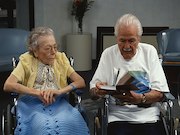Confusion independently associated with receipt of antibiotics for UTI in nursing home residents
MONDAY, Jan. 22, 2018 (HealthDay News) — Urinary tract infections (UTIs) are common in nursing home (NH) residents, and new or worsening confusion is strongly associated with antibiotic treatment for suspected UTI, according to a study published online Jan. 10 in the Journal of the American Geriatrics Society.
Sean Mayne, M.B.B.S., from James Cook University in Cairns, Australia, and colleagues reviewed the charts of 450 NH residents to determine the prevalence of documented UTI, new or worsening symptoms that are specific or nonspecific to the urinary tract, antibiotic use, medical conditions, and medication factors.
The researchers found that UTI accounted for 33 percent of all current infections treated with antibiotics. One in five NH residents had received antibiotics within the last 30 days, of which 45 percent were for UTI. The most significant factors that were independently correlated with antibiotics for UTI were urinary catheter (odds ratio, 13), urinary frequency (odds ratio, 10), fever (odds ratio, 10), new-onset hypotension (odds ratio, 10), and confusion (odds ratio, 8.9), with confusion the most prevalent factor in the population.
“UTI is commonly documented in NH residents, with new or worsening confusion being one of the strongest factors associated with antibiotic treatment for suspected UTI,” the authors write.
Copyright © 2018 HealthDay. All rights reserved.








